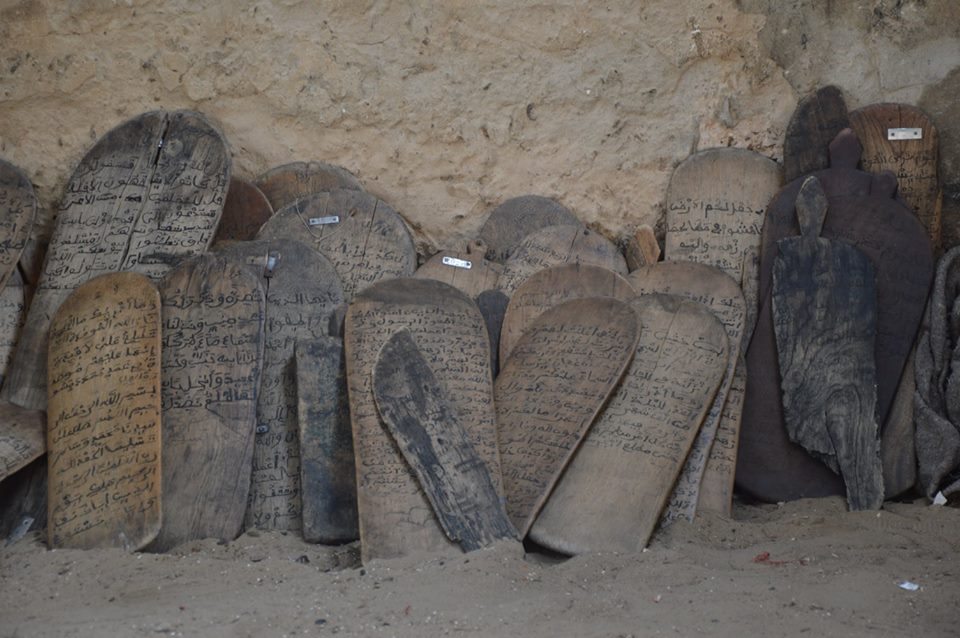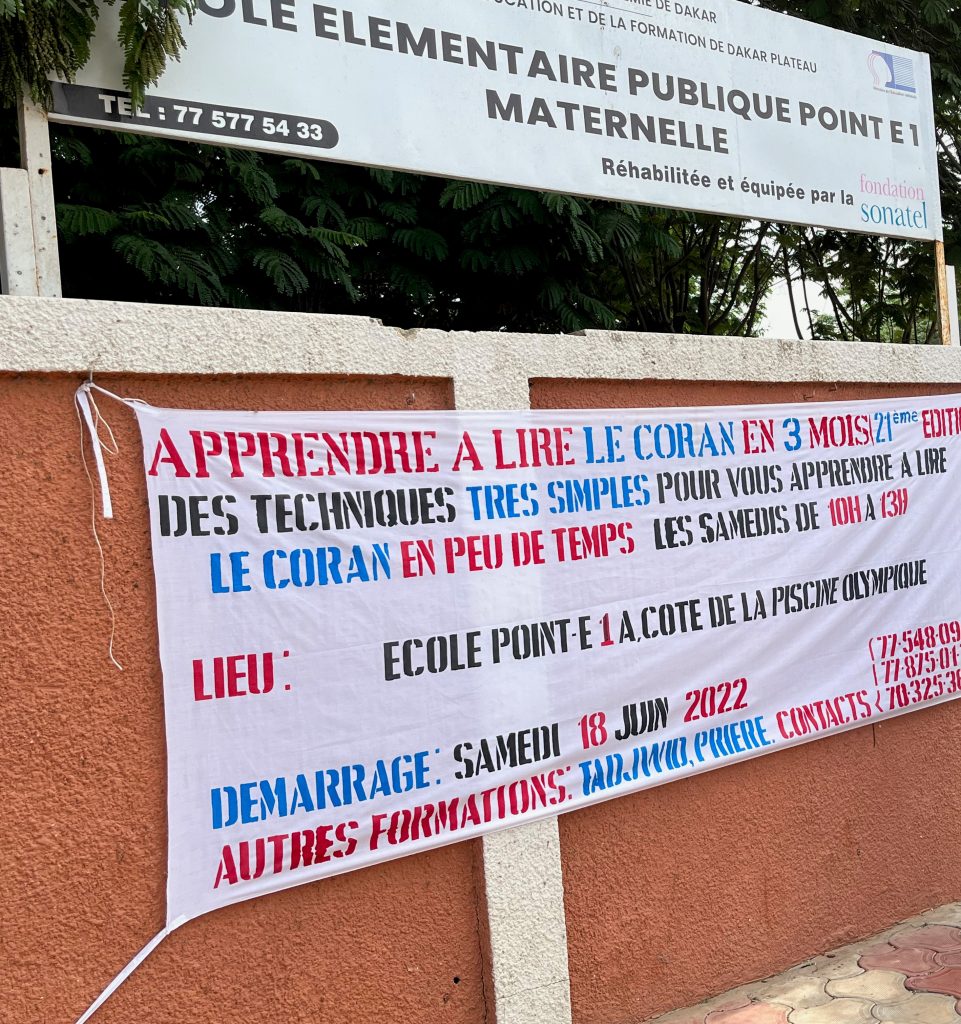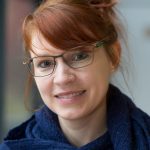
Making sense of Qur’anic school preference in West Africa
The challenges of secular bias and ontological injustice in scientific theories of educational decision-making
Dr Anneke Newman, Université Libre de Bruxelles
The remit of the INSBS is to study the relationships between ‘science’ and ‘belief’ in society. Yet what if the very conceptualization of these terms—and the tools social scientists have at their disposal to study these dynamics—were far from neutral, but instead privilege secular ontology and epistemology, leading to profound misinterpretations of the experiences and motivations of people of faith? This article—inspired by my forthcoming monograph, and generously funded by an INSBS Early Career Mentoring Grant—argues that secular ontological bias is endemic within the Western social sciences, and constitutes an ontological injustice (Wilson, 2017). I unpack how this bias manifests in relation to theorizing around educational decision-making—particularly preference for faith-based schools, using examples from the strongly Islamic context of northern Senegal—and the causes and implications of this bias.
[S]ecularism’s dominance constitutes an ontological injustice, where both alternative non-secular visions of the world and visions of alternative non-secular worlds are subordinated to secular ontologies.
Wilson, 2017, p. 1076
I first became aware of the manifestations of ontological injustice in 2010 when I conducted ethnographic fieldwork on educational decision-making in Senegal as part of a PhD in anthropology. Barely weeks into my fieldwork, I was confronted with a jarring juxtaposition. On the one hand, I encountered time and again negative stereotypes about Qur’anic schools in West Africa—which teach moral education, and recitation and memorization of the Qur’an—in policy documents, and among development actors and scholars of international education (IE). Common stereotypes included that Qur’anic schools provided a poor-quality education and a child protection concern, and that parents opt for such schools for their children because of poverty, ignorance of their poor conditions, wilful neglect, or extreme religiosity.
On the other hand, I observed the rich and complex ways in which an Islamic worldview shaped Senegalese Muslims’ everyday lives, including in relation to educational preferences and strategies. Among a sizeable proportion of the population, this included positive evaluations of, and a preference for, Qur’anic schools. I soon learned that the stereotypes listed above represented a set of ‘meta-narratives’ which simplified the complexity of human behaviour for policy-making purposes. All of these stereotypes were challenged by the parents and youth that I met in northern Senegal.
For instance, in the commune where I did fieldwork, around one fifth of boys attended Qur’anic schools full-time rather than the accessible and affordable secular state schools. Qur’anic schools were not perceived by the boys’ parents as being a poor-quality education, or detrimental to their sons’ futures. Rather, memorising and reciting the entire Qur’an, in proximity to a Sufi cleric with a reputation for piety and Islamic knowledge, was known to please Allah and hence confer baraka – or divine grace – which grants spiritual and material benefits in the present world and in the hereafter. While acquisition of this knowledge and moral disposition were valued by others and hence rewarded with status and prestige, the desire to develop and strengthen a personal and direct relationship with Allah were powerful underlying incentives for parents and youth.

Furthermore, several parents and students considered that Qur’anic schools had as many social and economic returns—if not more—than the secular state schools, to the point that some youth even dropped out of state schools to attend Qur’anic schools instead. In large part, this was due to the existence of a thriving local and transnational ‘spiritual economy’ which has been widely documented throughout the Islamic world. This economy refers not only to recognised professions like imam or teacher, but rather the practices of skilled specialists who, in return for cash, use ‘secret’ Islamic knowledge to perform prayers or make amulets for healing purposes, or to ensure positive outcomes in everyday endeavours whether applying for a job or visa, or sitting an exam (Last, 1988; Soares, 2005; Hoechner, 2018). No one has attempted to quantify the scale of the informal spiritual economy in the Islamic world, but in Senegal the country’s most respected Muslim clerics have amassed significant wealth through this method (Kane, 2016). I also found it to be a regular income stream among many graduates of Qur’anic schools, who used it to supplement their other jobs as farmers, schoolteachers, or traders. Furthermore, even the parents and youth who opted for secular state schools, for economic and social reasons, felt that this education was lacking and attempted to supplement their Islamic knowledge through informal means.

After my fieldwork in Senegal, I returned to the UK to write up my thesis. There I found that, in the discipline of IE, stereotypes about strong faith-based education—and people’s preference for it—were accompanied by silences, namely a generalised lack of awareness paid to religion, or ontology and epistemology, and how they shaped educational dynamics and social life more generally. Indeed, it is extremely rare that IE scholars study the wider relationships between religion and education beyond formal institutions, despite the fact that 84% of the world’s population is “religiously affiliated” (Pew Research Center, 2012), and whose experiences are therefore filtered through the lenses of religious ontologies. In Africa, religiosity is particularly high with 90% of people stating that religion is “very important” in their lives (Pew Research Center, 2020, p. 3). It is such religiosity which drives the informal spiritual economy in the Islamic world. Yet, ignorance of this economy among education and development practitioners and scholars is a good illustration of the general lack of awareness of the importance of faith in people’s everyday lives. Indeed, judging from my conversations on this topic, most tend to consider the spiritual economy as mere superstition, and hence ignore its lucrative nature and, in turn, its relevance to people’s educational strategies. I argue that these stereotypes and silences share a common cause: secular ontological bias in Western social science.
Secular bias in the Western social sciences
Despite claims to objectivity and neutrality, secularism is a highly specific, culturally-embedded descriptive and prescriptive model that emerged in Euro-American contexts as part of the Enlightenment, and has become influential across diverse regions of the world (Gutkowski, 2014, p. 6). The past fifteen years have seen the rise of critical scholarship illustrating and challenging secularism in the theoretical social sciences as well as applied disciplines (like development studies and IE), and their practical applications, as a source of material, epistemological and ontological injustice.
Material inequality refers to the unequal distribution of resources and opportunities. Secularism has been “the dominant model for liberal statecraft and a powerful worldview/ideology structuring Euro-American political communities since the Enlightenment” (Wilson, 2017, p. 1078). As a political doctrine and mode of governance, secularism therefore constitutes “a critical structuring element in prevailing modes of identity, power, and exclusion” (Wilson, 2017, p. 1077). For instance, international development and global justice actors tend to rely on secular modern political traditions, such as liberalism and socialism, which marginalise religious and indigenous perspectives on how global inequalities should be defined and responded to (Deneulin and Bano, 2009; Wilson, 2017).
In addition, secularism is an epistemology which dictates what it is possible to know, and through what means. Epistemological injustice happens when secular epistemologies—associated with, and legitimised through, positivist science—wield unequal authority in defining what forms of knowledge, types of evidence, and frameworks for analysis, are considered ‘acceptable’ or ‘reliable’, thus side-lining other ways of knowing (Asad, 2003; Wilson, 2017; Barnes, 2020; Istratii, 2021). In particular, secular epistemologies rely on a dichotomy between the ‘secular’ as a category held in place through conceptual opposition to its anti-thesis ‘religion’, framed as largely irrational or at least non-rational, clearly identifiable and distinguishable from other domains of human activity, and which is (or should be) private and individual (Asad, 2003). Due to its origins in the context of Euro-American imperialisms, secularism is associated not just with binary oppositions between ‘secular’ and ‘religious’ but also ‘modern/primitive’, ‘reason/emotion’ and ‘Western/non-Western’” (Wilson, 2012).
The secularisation thesis, following the above characteristics, has wielded enormous influence in shaping how religion is understood and dealt with in practical terms in international development. Developed by sociologists in the classical tradition informed by evolutionist thought, the secularisation thesis holds that processes of ‘modernisation’ in production in eighteenth century Europe were accompanied by a parallel shift in values and beliefs from ‘traditionalist’, ‘primitive’, ‘superstitious’ religious thought to rational, scientific, secular explanations. It was assumed that this pattern was universal, and that the role of religion would decline as all societies modernised, retreating to the private sphere of personal faith (Stark and Finke, 2000; for summaries see Furseth and Repstad, 2006). The secularisation thesis underpinned Modernisation Theory dominant in development studies and policy from the 1950s, and its proponents assumed that the re-organisation of social and cultural institutions would not only accompany economic growth but facilitate it. Hence, religion was mainly considered—like ‘culture’—as an obstacle to economic growth and hence development (Nkurunziza, 2007; White and Deneulin, 2009).
Finally, secularism is an ontology, namely a theory about what exists, including specific assumptions about the world, human beings, their relationship to one another, to nature, to the supernatural (if it exists), and to themselves (Viveiros de Castro, 2013). Secular bias entails ontological injustice because secular ontologies “retain their claim to universality and continue to position themselves as superior to non-secular ontologies” which results in “the devaluing and exclusion of different ‘theories and understandings about what exists’” (Wilson, 2017, p. 1077). In contrast, anthropologists working within the ‘ontological turn’ have argued that we need to take ontological plurality seriously, which involves valuing different ontologies which are not necessarily compatible. This has radical theoretical implications for the social sciences, as Erin Wilson explains (2017, p. 1083):
Where epistemological injustice may be described as the exclusion of alternative views of the world, ontological injustice is concerned with the exclusion of views of alternative worlds (Viveiros de Castro, 2013). It is not simply that we must acknowledge that different people view the world differently, but rather that we must be open to the possibility that different people inhabit different worlds. It is not that we assume that there is a ‘real’, ‘factual’ world ‘out there’ that is simply interpreted differently (and incorrectly) by people who do not think ‘like us’, but rather that we consider the possibility that their world is in fact different (Blaser, 2013, pp. 552–553).
The ontological turn has enormous implications for social scientific methodology, analysis, and theory development, which are at present informed by secular ontology and epistemology. It demands that social scientists resist attempting to ‘explain away’ religious phenomena, for instance by referring to religion as a set of ‘symbolic interpretations’. Moreover, Christian anthropologist Jamie Barnes argues that social scientists who study religion tend to focus on people’s behaviour, and discourses or narratives, but fail to appreciate how these are grounded in affective, embodied phenomenological experiences which make their ontology real. The challenge for the social scientist is that these experiences are often ‘sensed’ using different sensory registers to the five Aristotelian senses of secular epistemology (vision, hearing, taste, smell, touch), and are thus extremely difficult for people of faith to communicate through language, especially to researchers with a secular ontological position (Barnes, 2020).
Secular bias in theories of educational decision-making
To return to the stereotypes about Qur’anic schools in West Africa, I soon found that the three dominant scientific theories for making sense of preference for faith-based schooling reflected secular epistemological and ontological biases, and therefore failed to do justice to the affective experiences and motivations that I encountered among Muslims in Senegal. I go through each of these theories in turn, namely Rational Choice Theory, New Institutional Economics, and Pierre Bourdieu’s framework of field, capital and habitus.
Rational Choice Theory
The dominant model for explaining educational decision-making within development studies and IE is Rational Choice Theory (RCT). Developed by classical economists, RCT assumes that people are rational actors who prefer the most utility-maximising option available, with utility defined in narrowly materialistic terms (Schulz, 1987). RCT as applied to education is strongly informed by Human Capital Theory (HCT) (Becker, 1993), which posits that ‘education’—defined as secular or weak faith-based schooling in the Western model—confers objectively measurable and universally applicable utilitarian returns in the form of economic and non-monetary social benefits. Utility-maximising parents will therefore prefer to send their children to schools (Stigler and Becker, 1977). When parents’ school preferences do not match the predictions of RCT/HCT, economists tend to blame inadequate information of opportunities or observable structural barriers, rather than valid preference for alternatives. The three main reasons or ‘barriers’ given for not attending state school are: direct and indirect poverty; equity barriers; and poor ‘quality’ schools which do not confer promised returns (Hunt, 2008).
RCT/HCT wields enormous influence over international education policy as well as scholarly discourses on education in international contexts (Ball, 2007). This is linked to “economic imperialism” (Allais, 2012) whereby economics as a positivist discipline, grounded in large-scale mathematical modelling, lays enormous claim to presenting a value-neutral and objective view of the world, and therefore purports to be more ‘scientific’ than other social science disciplines. However, economics is rife with value-judgements and assumptions reflecting Eurocentric and secular biases (Kanth, 1998), which are exposed in its explanations for how religion shapes educational dynamics. Indeed, when accounting for preference for strong faith-based schools, RCT/HCT takes for granted the assumption—as per the secularisation thesis—that ‘quality’ secular schools confer economic benefits and that strong faith-based schools do not (Deneulin and Bano, 2009). Proponents of RCT thus face a dilemma when trying to explain why parents choose to attend religious schools over secular schools, when the latter are accessible and affordable—as was the case for my informants in northern Senegal. RCT theorists have attempted to adapt the model which assumes that people are utility-maximising by drawing heavily upon influences from the sociology of religion, a discipline also shaped by the secularisation thesis. One theory is that choosing religion is an ‘irrational’ anomaly, rooted in the stereotypes of classical sociologists and anthropologists who presumed that religious belief was a figment of the imagination of pre-modern or ‘primitive’, irrational minds (Stark and Finke, 2000). Reflecting the legacy of this stereotype is Socialisation Theory, which suggests that people are passively socialised into religious belief and make decisions reflecting this internalised logic even if it does not benefit them materially (Furseth and Repstad, 2006).
An alternative approach among advocates of RCT is to reject the assumption of irrationality, instead attributing religious belief to pursuit of non-material “religious rewards” (Stark and Finke, 2000) sought out for materialist reasons (Bano, 2012). To clarify, Karl Marx’s idea that religion is the ‘opium of the people’, a compensatory comfort to those at the bottom of the social hierarchy, has proved particularly influential. It has evolved into Deprivation Theory, which proposes that people pursue religious rewards – like hope, reassurance, or explanations for uncertainty – because of difficult circumstances of material or social poverty, or psychological insecurity (Glock and Stark, 1965). While overcoming the idea that religious behaviour is irrational, this theory nonetheless tends to attribute the popularity of religion – and thus strong religious education – to social or material deficiencies, marginalizing the intrinsic benefits and moral appeal of faith-based worldviews (Bano, 2012).
New Institutional Economics
An important corrective to RCT/HCT is the theoretical framework developed by Masooda Bano, professor of Development Studies at the Oxford Department of International Development (ODID), in her monograph The Rational Believer: Madrasas in Pakistan (2012). Bano presents the aforementioned limitations of RCT for explaining religious school preference, particularly how its accounts tend to reproduce an image of religious people as “irrational-rational actors” by failing to acknowledge that “in order to command adherence the given belief system must have moral or practical appeal for the believer” (2012, p. 8). Instead, Bano proposes a framework for understanding faith-informed educational decision-making grounded in New Institutional Economics (NIE), which draws on contributions from social science disciplines to a greater extent than classical economics. Its approach is therefore a middle-ground which focuses on “the forward-looking and maximizing behaviour of the rational actor”, characteristic of classical economics, while also recognizing “the role of power in restricting attainment of optimal institutional outcomes” characteristic of more structuralist and Marxist social science (2012, p. 9). NIE theorises that informal and formal institutions—such as religious belief and Islamic schools – “result from the forward-looking behaviour of individual actors and persist through time because they serve a definite purpose” (2012, p. 10).
Moreover, Bano aims to push forward theorizing in NIE by showing how religious behaviour, including preference for strong faith-based schools, reflects multiple motivations but also “dual notions of utility” with the former resting on “the human need for material achievement” and the latter “the pursuit of ideas”. According to Bano, “the constant struggle between material and ideal utility is central to the rationality of religious behaviour” (2012, p. 12). She explains that an Islamic ontology means that Muslims are orientated towards both “this world” and “the other world (the afterlife)” which results in a “conscious desire to endear themselves to God” (2012, p. 113) which shapes preferences (2012, pp. 105–6), although individuals differ in their “propensity towards other-worldly concerns” (2012, p. 122). Bano describes a wide range of “religious benefits” of madrasas and an Islamic worldview more broadly, including the inculcation of moral values (2012, pp. 107–8, 117) and a set of “logics” which help people explain the world and face challenging circumstances (2012, pp. 112–120). Finally, Bano proposes a solution to the “irrational-rational actor” problem by concluding that preference for madrasas among parents and youth in Pakistan was primarily motivated by desire for religious rather than material rewards, but that material deprivation in the form of livelihood and physical insecurity heightened people’s interests in those religious rewards.
While Bano’s work is an important corrective to traditional RCT/HCT, it still reflects secular ontological bias in two ways. First, by asserting that “psychological comfort is the real reward being sought through religious faith” (2012, p. 168) – which sounds very similar to Deprivation Theory – Bano focuses on the psychological and behavioural effects of religious ontologies, rather than the affective embodied experiences which often give rise to them in the first place. This is characteristic of theorising about religious behaviour within a secular ontological paradigm (Barnes, 2020). Second, Bano’s analysis of preference for madrasas in Pakistan relies on a neat distinction between secular and religious social spheres, as applied to education and economics (2012, p. 174). This binary is a reflection of secular bias, which frames ‘religion’ as something clearly identifiable and distinguishable from other domains of human activity (Asad, 2003). Indeed, beyond the preference that some parents display for madrasas, Bano doesn’t discuss how ontology and epistemology shape social life more broadly, and how that shapes engagement with education. Given my observations in Senegal, I couldn’t help but wonder whether the preferences that upper-middle-class Pakistanis had for secular schools could be explained away as the result of perceptions that the greater economic returns from secular schools outweighed religious concerns, as Bano suggests, or whether these people subscribed instead to a secular ontology. Conversely, if these individuals did have religious inclinations but economic utility swayed their decision, did they experience frustration at the ontological orientation of the secular school or seek to compensate through other means – which is what I saw in Senegal? Or, are ‘secular’ schools in strongly Muslim contexts actually shaped by Islamic ontology in their everyday functioning (Bradley and Saigol, 2012; Sommer von Würden, 2015), in which case they reflect less of a juxtaposition between ‘secular’ and ‘religious’ than might be assumed? These questions trouble the secular/religious binary and demonstrate the limitations of Bano’s framework.
Field, capital and habitus
The final theoretical framework used in IE scholarship to explain educational preferences and decision-making employs Pierre Bourdieu’s concepts of field, capital and habitus. According to Bourdieu, the social world can be thought of as a space subdivided into a multitude of microcosms, that he refers to as fields, each with specific “rules of the game” which are distinct from those of other microcosms. In each field, one can observe a struggle between individuals whose stake is, among other things, the acquisition of capital valued in that field, either to keep their position or to obtain a better one (2016). Bourdieu defines capital as scarce goods and resources, and his four main types are: economic, or material wealth; cultural, or valued knowledge and behaviour, which can be embodied as knowledge or dispositions, objectified in material or symbolic commodities, or institutionalized through diplomas or qualifications; social, or relationships and connections with others through which other resources can be acquired; and symbolic, namely the prestige, honour, or status associated with the acquisition of other forms of capital valued in that particular field (Bourdieu, 1986). The forms of capital are to some extent convertible. Their acquisition enables individuals to gain more capital, as well as power and authority, understood respectively as the legitimacy to take decisions effecting oneself and others, and the right to speak and to be heard. Through the cumulative effect of past experiences acquired by pursuing capital, individuals develop dispositions or habitus, which consists of internalised and often unconscious ways of thinking and interacting with the world (Bourdieu and Nice, 1977, p. 72).
Sociologists and anthropologists inspired by Bourdieu have long documented how people opt for Islamic education in West Africa for its religious benefits, symbolic capital or status, and social and cultural capital which can help graduates find work in the informal sector (Meunier, 1995; Gérard, 2001; Fall, 2011; Hoechner, 2018). Hence, in contrast to RCT which assumes that secular schooling has measurable utilitarian benefits and that parents’ decisions reflect (or ought to reflect) that reality, scholars inspired by Bourdieu show that perceptions of educational utility are socially constructed and context-specific (Demerath, 1999). However, the Bourdieusian scholarship on Islamic education in West Africa exhibits secular bias in the lack of attention it pays to the ways in which ontology and epistemology—and especially the experiential aspects of religiosity—shape people’s lifeworlds, and engagement with education. Indeed, in contrast to Bano’s account which devotes attention to the “intrinsic benefits” or “ideal utility” of religion, sociologists and anthropologists working to explain preference for Islamic education tend to gloss over religious motivations, or explain them away through reference to secular sociological or anthropological explanations – as is the trend among Western social scientists more generally (Barnes, 2020).

For instance, when explaining parental preference for Qur’anic schoolsin Senegal, Joanne Chehami (2016) mentions that such schools inculcate values and a sense of identity respected in Senegalese society, insert students into community and religious networks, and parents derive prestige from their child’s status as a hafiz (someone who has memorized the Qur’an). Thus, she reduces incentives to pursue religious education to expectations of social and symbolic capital. While Chehami mentions baraka or blessing, and pedagogy in the daaras linked to “mystical principles” associated with the Sufi orders (2016, p. 58), there is no discussion of ontology, people’s religious subjectivities, or affective experiences, and how these might shape their decisions.
Hannah Hoechner’s monograph on preference for Qur’anic schools in northern Nigeria (2018) does a much better job of unpacking these issues, and she makes significant efforts to demonstrate that “we cannot neglect the significance that religious, moral, and social considerations hold in their own right and independent of underlying material circumstances” (2018, p. 111). Furthermore she argues that preference for Qur’anic schools “is not merely ‘virtue made of necessity’” – a phrase used by Bourdieu (1990, p. 54) – “but also a positive choice of its own” (2018, p. 99). However, on balance, her monograph focuses far more on situating preference for Qur’anic schools within the context of widespread and protracted material deprivation—again , echoing Deprivation Theory—than on religious explanations. When Hoechner speaks of “religious reasoning”, she describes the value of Qur’anic schools for inculcating a physical and mental habitus that confers psychological resilience and symbolic capital that can be converted to economic and social capital later down the line – rather than delving deeper into the experiential underpinnings of religiosity and how these experiences motivate people. This focus on the material rather than the ontological or epistemological dimensions of educational engagement echoes Barnes’ critique (2020) that Western social scientists, working within a secular ontology, tend to focus on the discourses and observable behaviour of religious people, unaware of the affective experiences that underpin them.
Conclusion
To summarise, despite claims to neutrality and objectivity, Western social science is characterized by secular bias, whereby secular epistemological and ontological assumptions underpin the theoretical frameworks used to analyse human behaviour, including religious phenomena. The result is epistemological and ontological injustice, whereby other worldviews and understandings of knowledge and its acquisition are side-lined, denigrated, or dismissed. This bias is manifest in the three main scientific theories for understanding educational decision-making—which , in turn, inform educational policy-making in development countries—namely frameworks based on Rational Choice Theory, New Institutional Economics, and Pierre Bourdieu’s concepts of field, capital and habitus. My ethnographic data on Muslim parents’ and youth’s educational strategies in Senegal pushed me to see secular bias in each of these theories. In particular, they rely on a conceptual separation between ‘secular’ and ‘religious’ social spheres – when my data showed that no such separation existed in people’s minds. Rather, Islamic ontologies were the lenses through which people apprehended their everyday experiences, but these ontologies also shaped the material realities of physical and social worlds. Second, these theories of educational decision-making show a lack of appreciation for the affective, embodied experiences which reinforce religious ontology and behaviour, which I found were significant sources of motivation and conviction among the Senegalese that I met. Therefore, a result of secular bias, none of these theories is adequate for understanding educational strategies in ontologically plural contexts. These findings suggest that a new theoretical framework is urgently needed, which pays attention not just to how material considerations, be they economic or psychological, shape people’s educational preferences and strategies, but also to epistemological and ontological understandings and inequalities.

Anneke Newman is an anthropologist interested in the nexus between religion and development, and policies relating to education, gender, and health. Anneke is a Senior Postdoctoral Fellow at the Department of Conflict and Development Studies at the University of Gent. For more on her research see her profile in our Researcher Directory.
Bibliography
Allais, S. (2012) ‘“Economics imperialism”, education policy and educational theory’, Journal of Education Policy, 27(2), pp. 253–274.
Asad, T. (2003) Formations of the secular: Christianity, Islam, modernity. Stanford, CA: Stanford University Press.
Ball, S. J. (2007) ‘Big policies/small world: An introduction to international perspectives in education policy’, in Lingard, B. and Ozga, J. (eds) The Routledge Falmer reader in education policy and politics. London: Routledge, pp. 119–130.
Bano, M. (2012) The rational believer: Choices and decisions in the madrasas of Pakistan. Ithaca, NY and London: Cornell University Press.
Barnes, J. (2020) Stories, Senses and the Charismatic Relation: A Reflexive Ethnography of Christian Experience. London: Routledge.
Becker, G. S. (1993) Human Capital: A theoretical and empirical analysis, with special reference to education. 3rd editio. Chicago, IL: University of Chicago Press.
Bourdieu, P. (1986) ‘The forms of capital’, in Richardson, J. (ed.) Handbook of Theory and Research for the Sociology of Education. New York, NY: Greenwood Press, pp. 241–258.
Bourdieu, P. (1990) The logic of practice. Cambridge: Polity Press.
Bourdieu, P. (2016) Sociologie générale. Volume 2, Cours au Collège de France 1983-1986. Paris: Le Seuil.
Bourdieu, P. and Nice, R. (1977) Outline of a theory of practice. Cambridge: Cambridge University Press.
Bradley, T. and Saigol, R. (2012) ‘Religious values and beliefs and education for women in Pakistan’, Development in Practice, 22(5–6), pp. 675–688.
Center, P. R. (2010) Tolerance and Tension: Islam and Christianity in Sub-Saharan Africa. Washington, DC.
Center, P. R. (2012) The Global Religious Landscape: A Report on the Size and Distribution of the World’s Major Religious Groups as of 2010. Washington, DC: Pew Research Center.
Chehami, J. (2016) ‘Les familles et le daara au Sénégal: Entre facteurs macrosociaux, stratégies collectives et choix individuels’, Afrique contemporaine, 257(1), pp. 77–89.
Demerath, P. (1999) ‘The Cultural Production of Educational Utility in Pere Village, Papua New Guinea’, Comparative Education Review, 43(2), pp. 162–192.
Deneulin, S. and Bano, M. (2009) Religion in development: Rewriting the secular script. London and New York, NY: Zed Books.
Fall, A. S. (2011) ‘Les usages des liens confrériques religieux dans l’économie Sénégalaise’, in Kaag, M. (ed.) Islam et engagements au Sénégal. Leiden: Centre d’Etudes Africaines, pp. 46–77.
Furseth, I. and Repstad, P. (2006) An introduction to the sociology of religion: Classical and contemporary perspectives. Aldershot: Ashgate Publishing Ltd.
Gérard, E. (2001) ‘La demande d’éducation en Afrique: Approches sociologiques’, in Pilon, M. and Yaro, Y. (eds) La demande d’éducation en Afrique: Etat des connaissances et perspectives de recherche. Paris: FASAF Réseau sur la famille et la scolarisation en Afrique / Network on Family and schooling in Africa, pp. 63–79.
Glock, C. Y. and Stark, R. (1965) Religion and society in tension. Chicago, IL: Rand McNally.
Gutkowski, S. (2014) Secular war: Myths of religion, politics and violence. London: I.B. Tauris.
Hoechner, H. (2018) Quranic schools in northern Nigeria: everyday experiences of youth, faith, and poverty. Cambridge: Cambridge University Press.
Hunt, F. (2008) Dropping out from school: A cross country review of literature. Edited by T. and E. CREATE Consortium for Research on Educational Access. Falmer: University of Sussex, Centre for International Education.
Istratii, R. (2021) Adapting gender and development to local religious contexts: A decolonial approach to domestic violence in Ethiopia. London: Routledge.
Kane, O. O. (2016) Beyond Timbuktu: An Intellectual History of Muslim West Africa. Harvard University Press.
Kanth, R. (1998) ‘Against Eurocentred epistemologies: a critique of science, realism and economics’, in Fleetwood, S. (ed.) Critical realism in economics: Development and debate. London: Routledge, pp. 201–222.
Last, M. (1988) ‘Charisma and medicine in Nigeria’, in Cruise O’Brien, D. and Coulon, C. (eds) Charisma and Brotherhood in African Islam. Oxford: Clarendon Press, pp. 183–204.
Meunier, O. (1995) ‘Enseignements de base, politiques d’éducation et stratégies éducatives en milieu haoussa: Le cas de la ville de Maradi (Niger)’, Cahiers des sciences humaines, 31(3), pp. 617–634.
Nkurunziza, E. (2007) An overview of development studies: Background paper for the Religions and Development Research Programme. Working Paper 2. Birmingham: International Development Department, University of Birmingham.
Schulz, T. W. (1987) ‘Education and population quality’, in Psacharopoulos, G. (ed.) Economics of education: Research and studies. Oxford: Pergamon Press, pp. 9–14.
Soares, B. F. (2005) Islam and the prayer economy. Edinburgh: Edinburgh University Press.
Sommer von Würden, J. (2015) ‘Islamic and educational knowledge in Zanzibar schools: Jiins as a case’, in European Conference on African Studies. Paris.
Stark, R. and Finke, R. (2000) Acts of faith: Explaining the human side of religion. London & Berkeley, CA: University of California Press.
Stigler, G. J. and Becker, G. S. (1977) ‘De gustibus non est disputandum’, American Economic Review, 67, pp. 76–90.
Viveiros de Castro, E. (2013) ‘The relative native’, Hau: Journal of Ethnographic Theory, 3(3), pp. 473–502.
White, S. and Deneulin, S. (2009) ‘Culture and religion’, in Deneulin, S. and Shahani, L. (eds) An introduction to the human development and capability approach: freedom and agency. London: Earthscan, pp. 246–271.
Wilson, E. K. (2012) After secularism: Rethinking religion in global politics. Basingstoke: Palgrave.
Wilson, E. K. (2017) ‘“Power Differences” and “the Power of Difference”: The Dominance of Secularism as Ontological Injustice’, Globalizations, 14(7), pp. 1076–1093.
